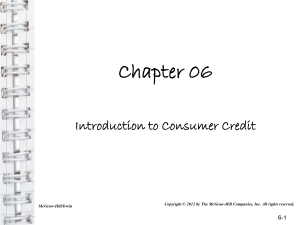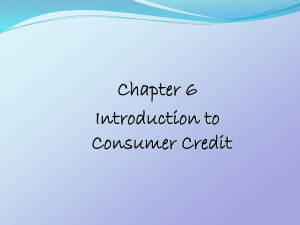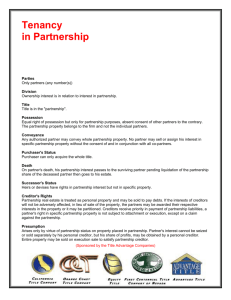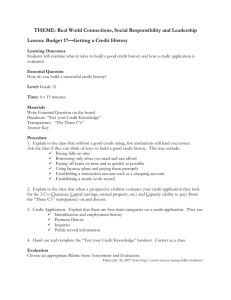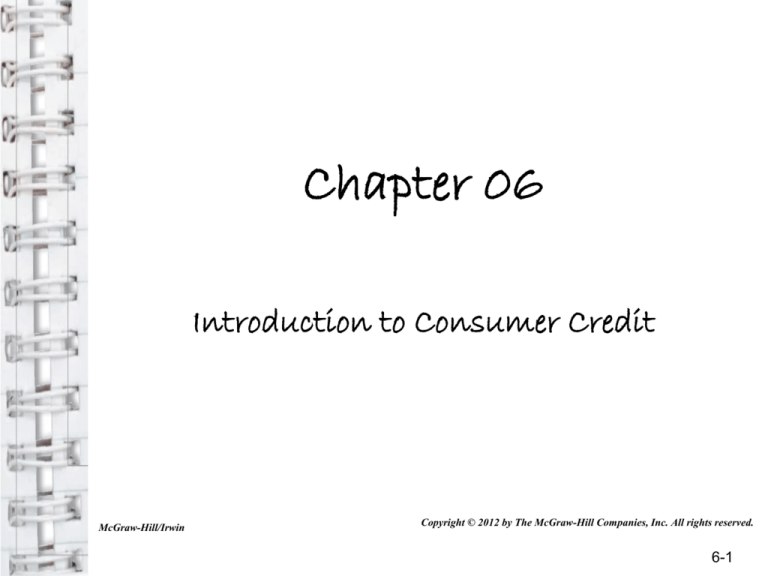
Chapter 06
Introduction to Consumer Credit
McGraw-Hill/Irwin
Copyright © 2012 by The McGraw-Hill Companies, Inc. All rights reserved.
6-1
Chapter 6
Learning Objectives
1.
2.
3.
4.
5.
6.
Define consumer credit and analyze its
advantages and disadvantages
Differentiate among various types of credit
Assess your credit capacity and build your
credit rating
Describe the information creditors look for
when you apply for credit
Identify the steps you can take to avoid and
correct credit mistakes
Describe the laws that protect you if you have
a complaint about consumer credit
6-2
What is Consumer Credit?
Objective 1: Define consumer credit and
analyze its advantages and disadvantages
• Credit is an arrangement to receive cash, goods or
services now, and pay for them in the future
• Consumer credit is the use of credit for personal
needs, except a home mortgage, by individuals and
families
6-3
What is Consumer Credit?
(continued)
• Three ways consumers can finance purchases
– Draw on their savings
– Use present earnings
– Borrow against expected future income
• Trade-offs with each alternative
• Consumer credit: A major economic force
6-4
What is Consumer Credit?
(continued)
USE AND MISUSES OF CREDIT
• Before you use credit for a major purchase, ask
yourself some questions
–
–
–
–
Do I have the cash for the down payment?
Do I want to use my savings for this purchase?
Does this purchase fit my budget?
Could I use the credit I’ll need in some better way?
6-5
What is Consumer Credit?
(continued)
USE AND MISUSES OF CREDIT (continued)
• Before you use credit for a major purchase, ask
yourself some questions
– Can I postpone this purchase?
– What are the opportunity costs of postponing this
purchase?
– What are the dollar and psychological costs of
using credit for this purchase?
6-6
What is Consumer Credit? (con’t)
ADVANTAGES OF CREDIT
• Current use of goods and services
• Permits purchase even when funds are low
• A cushion for financial emergencies
• Advance notice of sales
• Easier to return merchandise
• Convenient when shopping
6-7
What is Consumer Credit?
(continued)
MORE ADVANTAGES OF CREDIT
• One monthly payment
• Safer than cash
• Needed for hotel, car reservations and shopping
online
• Can take advantage of float time/grace period
• May get rebates, airline miles, or other bonuses
• Indicates financial stability
6-8
What is Consumer Credit?
(continued)
DISADVANTAGES OF CREDIT
• Temptation to overspend
• Failure to repay loan may lead to loss of income
• It does not increase total purchasing power
• Credit costs money
6-9
Types of Credit
Objective 2: Differentiate among various types of
credit
• Closed-End Credit
– One-time loans for a specific purpose that you pay
back in a specified period of time, and in payments
of equal amounts
• Mortgage, automobile, and installment loans for
furniture, appliances and electronics
6-10
Types of Credit (continued)
Open-End Credit
―Use as needed until reaching line of credit
max
•Credit cards, departments store cards, bank
credit cards, incidental credit
•You pay interest and finance charges if you
do not pay the bill in full when due
6-11
Types of Credit (continued)
CREDIT CARDS
•
Eight out of ten U.S. households carry one or more credit
cards
•
One-third are convenience users- pay balances in full each
month
•
Two-thirds are borrowers, carrying a balance over, paying
finance charges
•
Some use cards for cash advances – expensive
• Co-branding - linking a credit card with a business
offering rebates on products and services
• Smart cards have an imbedded computer chip
• Debit cards: similar impact as writing a check
6-12
Types of Credit (continued)
PROTECTING YOURSELF AGAINST
DEBIT/CREDIT CARD FRAUD
• Sign new cards when they arrive
• Treat cards like money - keep them secure
• Shred anything with your account number on it
• Don’t give your number over the phone unless you
initiate the call, and don’t put it on postcards
• Get card & receipt after every transaction: compare
receipts to bills when they arrive, checking for errors
• Notify the card issuer if you don’t get your billing
statement, or if your card is lost or stolen
– If stolen call 1-888-EXPERIAN
• Check credit report regularly
6-13
Types of Credit (continued)
When You Make Purchases Online
• Use a secure browser
• Keep records of online transactions
• Review monthly statements-can do so online
• Read policies of the websites you visit concerning
refunds, site security, and privacy
• Keep personal information private unless you know who
is gathering it and why
• Shop at businesses you know and trust
• Never give out your password to anyone online
• Don’t download files sent by strangers
6-14
Types of Credit (continued)
TRAVEL AND ENTERTAINMENT CARDS
• These cards are not really credit cards
• Monthly balance is due in full
• American Express recently started issuing credit
cards
6-15
Types of Credit (continued)
STORED VALUE (OR GIFT) CARDS
•
•
•
•
Resemble a debit card.
Used in lieu of paper gift certificates.
Used for business purposes (travel expenses).
Bankruptcy can make the cards worthless.
6-16
Types of Credit (continued)
HOME EQUITY LOANS
• Based on the difference between current
market value of your home and the amount
owed on the mortgage
• Borrow up to 85% of the value of the home
• It is set up like a revolving line of credit
6-17
Measuring Your Credit
Capacity
Objective 3: Assess your credit capacity
and build your credit rating
• Before you take out a loan, ask yourself
– Can you afford the loan?
– What do you plan to give up in order to
make the payment?
• Are you prepared to make this trade-off?
6-18
Measuring Your Credit Capacity
GENERAL RULES OF CREDIT CAPACITY
Debt Payments-to-Income Ratio
monthly payments*
net monthly income
Consumer credit payments should not
exceed a max of 20% of your net income
*Not including house payment which is a long-term liability
6-19
Measuring Your Credit Capacity
(continued)
GENERAL RULES OF CREDIT CAPACITY
Debt To Equity Ratio
total
liabilities
=
Should be < 1
net worth*
*Excluding home value
6-20
Measuring Your Credit Capacity
(continued)
CO-SIGNING A LOAN
• The creditor will give you a notice that tells you…
– You are being asked to guarantee the debt, so
consider if you can afford it if the borrower
defaults.
– If the borrow does not pay, you may have to
pay up to the full amount and also any late or
collection fees.
– If a payment is missed the creditor can collect
the debt from you without first trying to get it
from the borrower.
6-21
Measuring Your Credit Capacity
(continued)
If you do co-sign, consider...
– Can you afford to pay the loan? If not, your
credit rating could be damaged
– Liability for this debt may prevent you from
getting other credit that you want
– If you put up collateral, you could lose it if the
loan goes into default
– Check your state’s law to learn about cosigner’s
rights
– Request that a copy of overdue payment
notices be sent to you
6-22
Measuring Your Credit Capacity
(continued)
BUILDING AND MAINTAINING YOUR CREDIT
RATING
• Limit your borrowing to your capacity to repay
• Live up to the terms of contracts
• Check to see what is in your credit report
6-23
Measuring Your Credit Capacity
(continued)
CREDIT BUREAUS
– Credit bureaus collect information
– Experian, Trans Union and Equifax
– FTC gets about 12,000 complaints about
credit bureaus each year
WHO PROVIDES DATA TO CREDIT BUREAUS?
– Bureaus get information from banks, finance
companies, credit card companies, merchants,
other creditors
6-24
Measuring Your Credit Capacity
(continued)
Fair Credit Reporting Act
• This act regulates the use of credit reports
• Credit card companies must correct inaccurate or
incomplete information
• Only authorized persons have access to your
report
• Adverse data can be reported for seven years;
bankruptcy for ten years
6-25
Measuring Your Credit Capacity
(continued)
What If You are Denied Credit?
• Check your credit file at the credit bureau
• If you believe reasons for denial are invalid: file suit
and/or notify federal enforcement agency
• Ask the creditor to clarify reason for denial; if you
believe the denial is valid . . .
– Apply to another creditor with different standards
– Take steps to improve your creditworthiness
– You have the right to provide a 100 word
explanation in your file
6-26
Applying for Credit
Objective 4: Describe the information
creditors look for when you apply for credit
What Creditors Look For: 5 Cs
• Character - Do you pay bills on time?
• Capacity - Can you repay the loan?
• Capital - What are your assets
and net worth?
• Collateral - What property do you have to pledge
that the lender can repossess if you default on the
loan?
• Conditions - What economic conditions could
affect your ability to repay the loan?
6-27
Applying for Credit
How to improve your credit score:
1. Get copies of your credit report-review
2.
3.
4.
5.
for accuracy.
Pay your bills on time.
Understand how your credit score is
determined.
Learn the legal steps to improve your
credit report.
Beware of credit-repair scams.
6-28
Avoiding and Correcting Credit
Mistakes
Objective 5: identify the steps you can take to
avoid and correct credit mistakes
Fair Credit Billing Act
• Notify creditor of error in writing within 60 days
• Include your explanation of the error and your account
number to the billing inquiries address
• They must respond within 30 days
• Credit card company has two billing periods but no
longer than 90 days to correct your account or tell you
why they think the bill is correct
• Your credit rating is not affected while item is in dispute
6-29
Avoiding and Correcting Credit
Mistakes
(continued)
Fair Credit Billing Act
• You can withhold payment on
damaged or shoddy goods or
poor services if you have paid
for them with a credit card, if you
make a sincere attempt to
resolve the problem with your
creditor.
6-30
Avoiding and Correcting Credit Mistakes
(continued)
What if Your Identity is Stolen?
• Contact the fraud department of each of the three
major credit bureaus
– tell them to flag your file with a fraud alert
– include a statement that creditors should call you for
permission before opening any new accounts in your
name
• Contact creditors to check for accounts that have
been tampered with or opened fraudulently
6-31
Avoiding and Correcting Credit Mistakes
(continued)
What if Your Identity is Stolen? (continued)
• File a police report, keep a copy
• Check www.privacyrights.org or call 619-2983396
• File a complaint with the Federal Trade
Commission
1-877-FTC-Help
6-32
Complaining About Consumer
Credit
Objective 6: Describe the laws that protect you if you
have a complaint about consumer credit
• First try to solve the problem directly with the creditor
• If that does not work there are more formal complaint
procedures
• There are a variety of consumer credit protection laws
and federal agencies who administer and assist with
complaint procedures
See the Exhibit 6-11
“Summary of Federal Consumer Credit Laws”
6-33
Complaining About Consumer
Credit
(continued)
PROTECTION UNDER CONSUMER CREDIT LAWS
• Truth in Lending and Consumer Leasing
• Equal Credit Opportunity Act
• Fair Credit Billing Act
• Fair Credit Reporting Act
• Consumer Credit Reporting Reform Act
• Credit Card Accountability, Responsibility and Disclosure Act.
6-34

